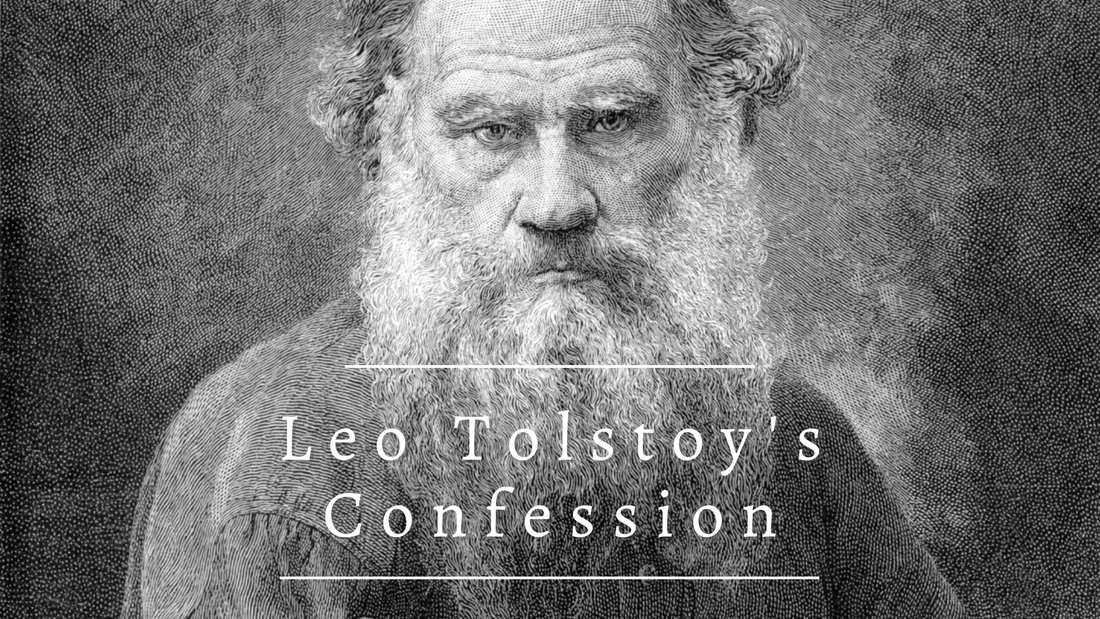|
Every now and then I land upon a book that causes me to pause, to slow my reading. My desire to absorb what I read surpasses my desire to finish the book, even such a short one as A Confession. Leo Tolstoy was 51. Having gained fame and fortune after publishing War and Peace (1869) and Anna Karenina (1877), he earnestly questioned his purpose in life. Tracing his childhood and young adult life at first, Tolstoy admits that he never thought about what he believed or why. He saw no reason to continue in the Orthodox Christianity he was brought up in. People at a certain level of education didn’t need faith, he thought. “Then as now, it was and is quite impossible to judge by a man's life and conduct whether he is a believer or not.” Tolstoy did not see how religious doctrine played a part in anyone’s life—“in intercourse with others it is never encountered, and in a man's own life he never has to reckon with it.” Instead of pursuing what he saw as an empty faith, he says, “I tried to perfect myself mentally—I studied everything I could, anything life threw in my way; I tried to perfect my will, I drew up rules I tried to follow.” His self-centered attempts soon led to wanting to appear more perfect than others. So he did whatever he wanted, and the older he grew, and the more he watched others, he knew he had to make progress. He wanted to be good but saw that he was alone in this desire. As he describes his military life, Tolstoy lists all of his sins, but as he turned to writing in his twenties, his fellow writers were no different at heart than the soldiers and officers he lived among for so long. It wasn’t long before he realized that “the superstitious belief in progress is insufficient as a guide to life. I had to know why I was doing it.” It makes me remember a phrase from long ago, “the cult of progress.” In a writer’s life today, it’s still a mantra. But then in Chapter 3, Tolstoy turns his thoughts to education as he considered plans for his own children someday. “I would say to myself: ‘What for?’” He was really asking how do we teach if we’ve never been taught-- In reality I was ever revolving round one and the same insoluble problem, which was: How to teach without knowing what to teach. In the higher spheres of literary activity I had realized that one could not teach without knowing what, for I saw that people all taught differently, and by quarreling among themselves only succeeded in hiding their ignorance from one another. But here, with peasant children, I thought to evade this difficulty by letting them learn what they liked. It amuses me now when I remember how I shuffled in trying to satisfy my desire to teach, while in the depth of my soul I knew very well that I could not teach anything needful for I did not know what was needful. After spending a year at school work I went abroad a second time to discover how to teach others while myself knowing nothing." Tolstoy clearly recognizes the voids within him. He tried to replace an absence of faith in God with a faith in himself. He tried to give himself purpose, trying to attain status and fame in the military and as a writer before turning to teaching peasant families, all before he married and had a family. His striving had left him empty, and with his retrospective, Tolstoy saw himself for what he lacked.
I’ve only read these first chapters of A Confession, and I think I’ll reread them before moving on. Maybe it’s because I’m near the same age as he was when he examined his life. Maybe it’s because, when I'm alone, I question the fruitfulness of my life. Regardless, Tolstoy gives us much to ponder. What do we truly value? Do I know what I believe? Do I know my purpose?
0 Comments
Your comment will be posted after it is approved.
Leave a Reply. |


 RSS Feed
RSS Feed